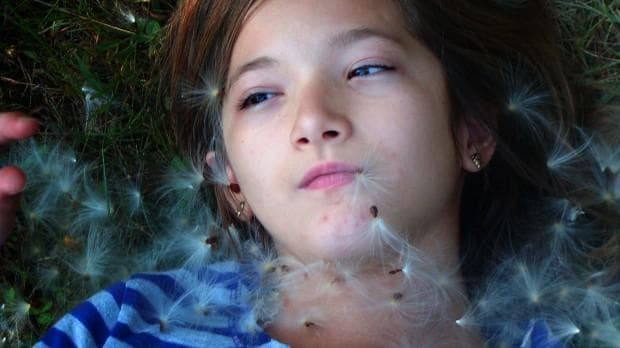Advertisement
Riley Cerabona: A Young Girl Living With CLOVES Syndrome

Riley Cerabona has already faced more in her life than a lot of us probably ever will. She was born with a rare disease that could only be treated with surgery — until now. Riley recently began taking an experimental drug that may — or may not — help her.
WBUR's CommonHealth series, The Life of Riley: A Rare Girl, A Rare Disease, will follow Riley and help tell her story.
CommonHealth co-host Carey Goldberg joined WBUR's All Things Considered host Deborah Becker to talk about Riley and her disease.
Deborah Becker: You and your colleague Jesse Costa have spent a lot of time with Riley and her family. So what is her disease exactly, Carey?
Carey Goldberg: Well, her disease is known as CLOVES. Basically, as Riley puts it, it makes lumps and bumps on and in her body. CLOVES is extremely rare — we call it one-in-a-million but it’s actually more like one-in-a-hundred-million. And it was only identified in 2008 by doctors at Children’s Hospital, Boston.
Riley’s surgeon, actually, Dr. Steven Fishman, told me that when he first operated on Riley as an infant, he thought that he was treating just a common, garden variety type of growth – or vascular anomaly – that infants and children are often born with:
Most of the time, these are localized abnormalities, and alarm bells for us don’t go off. But there are some vascular anomalies that are associated with more extensive problems. When Riley was born, we didn’t have any of those alarm bells. It was only later that we ended up realizing that there was more than met the eye.
So, for Riley, it’s not just the lumps and bumps that we can see. The problem is that some of these malformations grow inside her spine, and they’re very dangerous. Without surgery they could kill her. As it is, she’s been left with paralysis in her left arm.
What about Riley’s family? How are they coping?
Riley’s parents, Kristin and Marc, and her brother, Cole, have a lot in common with Riley. They have this sort of resilience, this ability to acknowledge the hard times but also still be happy about a lot of things. Apart from caring for their daughter and logistics and insurance issues and maintaining some sense of normalcy, Kristin and Marc — the parents — are dealing with this constant uncertainty. Here is Kristen:
One of the things that happens with us and with this syndrome is that we get told that things are okay and then we get told later that things are not okay. We are used to the drama. We're used to the drama.
And Riley's father Marc:
I’ve always been thankful that through all of this Riley’s been verbal. Whether she’s mad or sad or happy or whatever, she can tell us what she’s feeling, and she can verbally communicate that. She’s a smart, talented, little girl and her health is still just one thing about her — it’s not who she is.
Up until this point, treatment for Riley has basically been surgery, removing these growths.
Right, one after another.
But now she’s started on a drug trial. What happens from there?
We don’t know for sure. It’s a very experimental drug for this kind of syndrome. On Monday, Riley will have an MRI to see if there is in fact a new growth on her spine. If there is, she may have to drop of the trial. If not, then she and her family are hoping that the drug is helping her. In any case, we’ll be covering Riley’s progress as it happens on a week-by-week basis.
This program aired on April 6, 2012. The audio for this program is not available.
